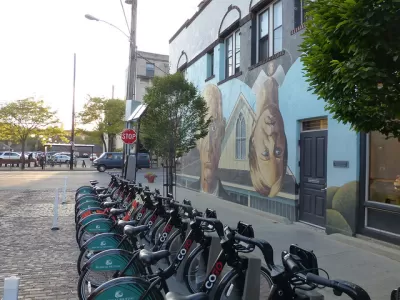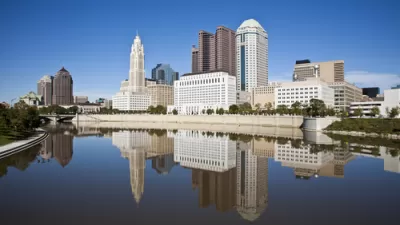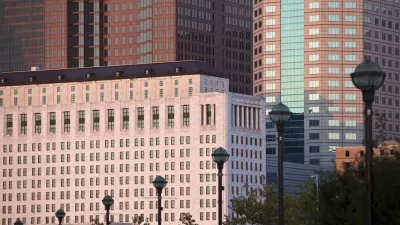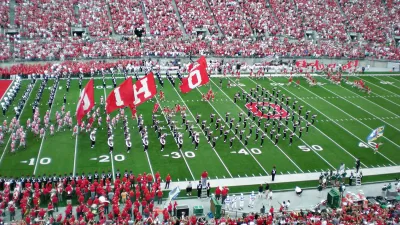The "Smart Cities Challenge" paid Columbus, Ohio $50 million to kick start a revolution of urban technology. The revolution never arrived, according to a recent assessment by Wired writer Aarian Marshall.

An article by Aarian Marshall evaluates the results of the $50 million grant awarded the city of Columbus, Ohio for the U.S. Department of Transportation's "Smart Cities Challenge" in 2016. Both the competition and Columbus' victory were huge urbanism and planning stories at the time—and the grant program was intended to achieve a game-changing legacy for the Obama administration. But after setting aside those aspirations, Marshall's assessment does not find much progress to report as a result of the competition.
Among the plans included in the winning grant proposal from the city of Columbus were "Wi-Fi-enabled kiosks to help residents plan trips, apps to pay bus and ride-hail fares and find parking spots, autonomous shuttles, and sensor-connected trucks," explains Marshall. Columbus also promised to deliver all of these new technologies in locations that provided access to underserved communities.
Here's how Marshall sums up the fruits of five years and $50 million in Columbus:
According to the project’s final report, issued this month by the city’s Smart Columbus Program, the pandemic hit just as some projects were getting off the ground. Six kiosks placed around the city were used to plan just eight trips between July 2020 and March 2021. The company EasyMile launched autonomous shuttles in February 2020, carrying passengers at an average speed of 4 miles per hour. Fifteen days later, a sudden brake sent a rider to the hospital, pausing service. The truck project was canceled. Only 1,100 people downloaded an app, called Pivot, to plan and reserve trips on ride-hail vehicles, shared bikes and scooters, and public transit.
As for the consequences of the failed "Smart Cities Challenge" experiment, Marshall warns of relying on technology as a silver bullet solution for all urban challenges, and also notes that some tech advancements that once seemed full of promise, don't seem quite as shiny. The same sentiment was echoed by a statement from Elon Musk the same week as Marshall's article declaring self-driving cars and autonomous vehicle technology a "hard problem" to solve.
For more background on the Smart Columbus Program and the Smart Cities Challenges see Planetizen tags for both.
FULL STORY: America’s ‘Smart City’ Didn’t Get Much Smartercolumbu

Study: Maui’s Plan to Convert Vacation Rentals to Long-Term Housing Could Cause Nearly $1 Billion Economic Loss
The plan would reduce visitor accommodation by 25,% resulting in 1,900 jobs lost.

North Texas Transit Leaders Tout Benefits of TOD for Growing Region
At a summit focused on transit-oriented development, policymakers discussed how North Texas’ expanded light rail system can serve as a tool for economic growth.

Why Should We Subsidize Public Transportation?
Many public transit agencies face financial stress due to rising costs, declining fare revenue, and declining subsidies. Transit advocates must provide a strong business case for increasing public transit funding.

How to Make US Trains Faster
Changes to boarding platforms and a switch to electric trains could improve U.S. passenger rail service without the added cost of high-speed rail.

Columbia’s Revitalized ‘Loop’ Is a Hub for Local Entrepreneurs
A focus on small businesses is helping a commercial corridor in Columbia, Missouri thrive.

Invasive Insect Threatens Minnesota’s Ash Forests
The Emerald Ash Borer is a rapidly spreading invasive pest threatening Minnesota’s ash trees, and homeowners are encouraged to plant diverse replacement species, avoid moving ash firewood, and monitor for signs of infestation.
Urban Design for Planners 1: Software Tools
This six-course series explores essential urban design concepts using open source software and equips planners with the tools they need to participate fully in the urban design process.
Planning for Universal Design
Learn the tools for implementing Universal Design in planning regulations.
Ascent Environmental
Borough of Carlisle
Institute for Housing and Urban Development Studies (IHS)
City of Grandview
Harvard GSD Executive Education
Toledo-Lucas County Plan Commissions
Salt Lake City
NYU Wagner Graduate School of Public Service





























